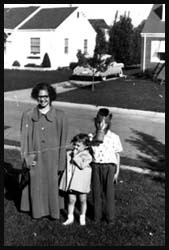
A Review: ‘Yidl in the Middle’
Written by Chris Cooke | Posted by: Anonymous
In her documentary "Yidl in the Middle," Booth describes the dual life she led, as both orthodox Jew and model Iowan citizen. Her singsong narration keeps the tone light, neither comic nor brooding, as she relates the different societal pressures Jews felt to assimilate into that tranquil sea of all-American conformity, Christian Iowa. She charts the history of Jews in Iowa, from the first immigrants in the 1850s, who had to conform to survive, to the Hasidic Jews who can today live there relatively undisturbed. The pressures to conform, not surprisingly, came from all sides—some of the most overt pressure coming from reformed Jews afraid of being associated with orthodox Jews and their "strange ways." Even within the orthodox Jewish community, blending in was encouraged; setting a bad example reflected poorly not only on you and your family but on all Jews. So her family became Jewish in private, Iowan in public. They kept a strictly kosher home, yet went out for cheeseburgers and fried chicken.
Likewise, racial and religious prejudice in Iowa was not a matter of public concern; all was friendly and tolerant on the surface among the smiling Iowans. But secret ballots in the ‘60s upheld the exclusion of Jews from the local country club; it took an open vote to change the club rules.
Booth’s film moves adeptly from past to present, mixing clips from her current family life in Cambridge and a recent high school reunion with a surprisingly abundant supply of home movies and photos from her past. Her Midwestern pleasantness lends her narration a folksy quality, but the apparent simplicity of the film and her narrative is deceptive. If, at times, Booth seems a bit redundant describing her dual Jewish/Iowan upbringing, it’s because the film deals with prejudice in its least obvious, most day-to-day manifestations. There are no big revelations here, no raging Klansmen, no violent hate-crimes—only example after example of the subtle, oft-overlooked ways that difference shapes character.
And it is this difference that is Booth’s main topic. Our country, the most diverse in the world, has been built almost entirely by immigrants—yet we still do not know exactly how to accept difference, or even how to talk about it. In "Yidl in the Middle," Marlene Booth has shown that she does know how to talk about it, and in a thorough, reasonable, and yet casual manner. This is a film for Jews and non-Jews alike, young and old—for those struggling with their own difference and those who need to be reminded of this struggle, wherever it lies.









